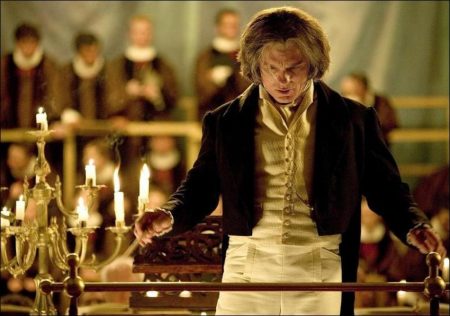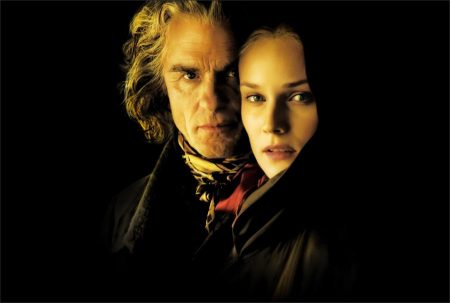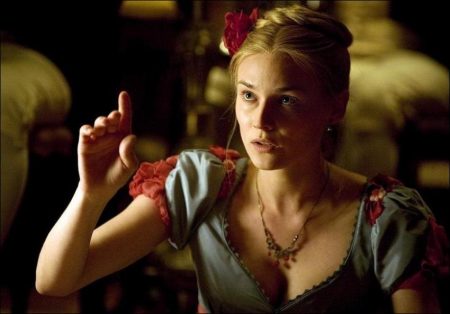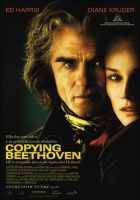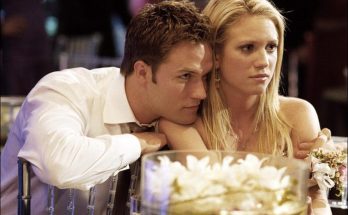Tagline: Taglines: He was the greatest composer of his time. One last performance would define his genius.
Young Anna Holz (Diane Kruger), a student at the Vienna Music Conservatory is summoned to the offices of Herr Schlemmer, Beethoven’s publisher. His Ninth Symphony is about to be premiered and Schlemmer, who is dying of cancer, needs a copyist to complete the score. Anna eagerly accepts, despite his warning that Beethoven (Ed Harris) is a monster.
As her work of copying down the music of Beethoven proceeds, Anna is drawn into the maestro’s tortured and inspired world. She sees their collaboration as a God-sent opportunity to prove her own talent as a composer; he glimpses in her a pure soul who might help him realize the culmination of his art – the creation of the last string quartets, the most sublime and spiritual music ever written. Beethoven reveals his growing need and affection for Anna as they work together on the string quartets. She boldly shows Beethoven her own work. Thoughtlessly, he derides it and she leaves him in despair.
Desperate, Anna accepts her longtime paramour, Martin’s, proposal of marriage. Beethoven storms after her – she must choose between Martin and him. Anna tries to flee Vienna but cannot; her destiny is linked to Beethoven’s. She returns to finish their work and finds him dying. From his dictation she copies the last of the quartets. His work on earth done, he frees her to become what he tells her she was born to be – a composer.
Copying Beethoven is a 2006 dramatic film released by Metro-Goldwyn-Mayer and directed by Agnieszka Holland which gives a fictional take on the triumphs and heartaches of Ludwig van Beethoven’s last years. It stars Ed Harris, Diane Kruger, Matthew Goode, George Mendel, Joe Anderson, Angus Barnett, Matyelok Gibbs, Bill Stewart, Phyllida Law, Nicholas Jones and David Kennedy.
All About Copying Beethoven
1824. It is the eve of the premiere of Beethoven’s Ninth Symphony, and parts are not ready. Music publisher Wenzel Schlemmer (Ralph Riach) urgently needs a copyist to finish the work, and young Anna Holtz offers one advantage: she is available.
While knowing that working with a woman is anathema to the ill and cantankerous Beethoven, Schlemmer has no choice but to hire her. Anna sees it as an opportunity sent from God to show the famous composer her work, and accepts eagerly.
“In those times women rarely had careers, so leaving her family and hometown to study composition was a courageous step,” says Diane Kruger. “Anna’s not afraid to stand up to Beethoven, though she is, naturally, intimidated by his persona.”
In one of their first encounters, learning of Anna’s career ambitions, Beethoven tries to overawe the eager student, remarking, “A woman composer is like a dog walking on its hind legs: it’s never done well, but you’re surprised to see it done at all.”
Undeterred, Anna boldly enters his mesmerizing realm, assisting his manic efforts to tap the deepest recesses of his talents. The experience will profoundly change her fate and being.
“Beethoven is one of those larger-than-life characters about whom you can say, ‘Everything you’ve heard is true’ – or at least most of it,” explains director Agnieszka Holland. “He changed the very notion of music, destroying rules, conventions—and the nerves of some who worked with him—along the way.”
Bombastic, brilliant, generous, unforgiving, yet kind-hearted, Beethoven ruled over the cultural landscape of Europe in the first quarter of the 19th century. Unlike predecessors such as Mozart, Beethoven’s reputation was renowned during his lifetime.
“Beethoven was really the first freelance musical artist,” remarks screenwriter Christopher Wilkinson. “He composed on his own terms, and was not dependent, as was precedent, on salaried positions with the church or a royal family. He believed talent should be valued above bloodlines and titles, a rather radical notion for its time.”
A well-known quote from musicologist Harold C. Shoenberg in Lives of the Great Composers states that while Mozart moved in the periphery of the aristocracy, “Beethoven kicked open the doors, stormed in and made himself at home.”
Says Ed Harris, “He is the greatest musician to ever walk the planet. There was a force flowing through him, and he suffered through unimaginable torments in order to write it down the way he experienced it, openly and honestly.”
The audience is allowed inside the silent solitude of Beethoven’s life through the eyes of Anna Holtz, a fictional character based on actual persons in Beethoven’s life or the larger musical realm of Europe.
Comments screenwriter/producer Stephen Rivele, “The great challenge in dramatizing the last years of Beethoven’s life is that he really had no one to talk to: his deafness was profound and his relationships were therefore hindered. Anna opens for us the door to his world.”
Rivele indicates that two of the real-life figures that form the composite for Anna’s character were male Austrian music students who worked with Beethoven’s longtime copyist. Christopher Wilkinson mentions two other inspirations: a female composer living in France, Lorenc Ferenz, who was highly influenced by Beethoven’s music, and another woman whose simple act of devotion has become the stuff of lore.
“During my earliest research I was struck by the famous story of a woman who entered the stage to turn Beethoven around to face the tumultuous applause at the conclusion of the Ninth Symphony,” explains Wilkinson. (Some authors claim the woman to be Caroline Unger, one of the singers). “This gave us the thought of approaching the story from the imagined perspective of very close to his heart.”
Beethoven’s music draws Anna deeper into the mind of its creator, revealing the whirlwind genius it harbors. Although at heart a gregarious and social being, the composer’s worsening deafness and anxieties drive him into increasing isolation. He is scorned by his nephew, Karl (Joe Anderson), whom he describes as “his whole life,” and beleaguered by unsettled domestic situations. Reflective of his mood, his music from those years is deemed too weighty for the Viennese audiences, who prefer the frivolity of Italian opera.
“At the time he is about to debut the 9th, Beethoven has fallen out of favor in Vienna,” says the film’s music consultant, Piotr Kaminski. “It has been years since his last symphony and audiences are not as interested in instrumental music. Audaciously, he added singers to the symphony, which is both a scandal and a PR magnet. The 9th, which was the first symphony to extend beyond an hour, would mark one of the great comeback stories of all time.”
“The Viennese were sophisticated, educated and knowledgeable about music, a tough crowd to impress,” agrees Christopher Wilkinson. “They were blown away.”
After the success of the premiere, with Vienna again at his feet, Beethoven begins writing the late string quartets, a new and perplexing sound that he describes as a bridge to a new form of music altogether. In one of the most revealing scenes in the film, Beethoven explains to Anna that God lives not in men’s heads or souls, but in their guts.
“His last period is so intense, he went to such deep places, that he damaged his health,” says Holland. “From the throes of his most agonizing period came his most difficult and beautiful music. It needs a more sophisticated approach to make it accessible. We’re attempting to be faithful to his biography with the plotlines, while utilizing necessary artistic license. Both the tragic and comical resonate in the script, as does his impact on history, the manner in which he changed the notion of genius, and the relationship between composers and society.”
Says Ed Harris, “His fortitude was impressive. He was sick, deaf, and terribly lonely, yet he felt he must get this music out of him, and he did until the day he died.” From such abject sorrow such pure beauty. As Beethoven confesses in the film, “Loneliness is my religion.”
Exposing new audiences to the composer’s late string quartets was one of the driving motivations of Rivele & Wilkinson’s screenplay. The duo has been interested in scripting a story of the fabled composer since the early ‘90s, intent on focusing on his final years. (A previous film about Beethoven, “Immortal Beloved,” dealt primarily with his love affair with an unknown woman, earlier in his life.)
Rivele says, “The late works are the most sublime and inaccessible of all his music — a language he invented to express the spiritual world he was experiencing at that point in his life. We wanted to create a drama that could help bring this remarkable music to audiences in a way they could fully appreciate.”
Although initially unable to fully understand this new musical language, Anna’s obsession with Beethoven continues to consume her life, threatening the relationship with her eligible, well-to-do suitor, Martin Bauer (Matthew Goode). Architect, engineer, student of science, Martin is apprehensive of Anna’s desire to enter a man’s world of composing, and is distrustful of Beethoven.
On the night of its premiere, Martin can’t help but appreciate the stirring exhilaration of the 9th, at the same time realizing that its awesome effect on Anna will begin to pull her further into Beethoven’s orbit, and away from his.
“Martin sees Anna doing something much different with her life than she does,” says Diane Kruger. “Beethoven has intensified her ambitions and desires, and she begins to doubt if she can be with someone who doesn’t fully appreciate art and music, not to mention her own desire and talent.”
As she begins to turn away from the man she loves, and toward the man she reveres, Anna becomes fully engulfed in Beethoven’s aura. She becomes muse and witness to a profound struggle between mortality and an indomitable human will, an epic confrontation whose musical expression has rung in ears, hearts and souls ever since.
“This story is a testament of hope and inspiration rising from turmoil,” says Stephen J. Rivele. “Having once mocked her ambitions, Beethoven asks Anna to help him with the last string quartets—his legacy to the future of music. She learns the deepest meaning of music, and finds the strength to become an artist of her own making.”
Copying Beethoven (2006)
Directed by: Agnieszka Holland
Starring: Ed Harris, Diane Kruger, Matthew Goode, George Mendel, Joe Anderson, Angus Barnett, Matyelok Gibbs, Bill Stewart, Phyllida Law, Nicholas Jones, David Kennedy
Screenplay by: Stephen J. Rivele, Christopher Wilkinson
Production Design by: Caroline Amies
Cinematography by: Ashley Rowe
Film Editing by: Alex Mackie
Costume Design by: Jany Temime
Set Decoration by: Zoltán Horváth
Art Direction by: Paul Ghirardani, Lóránt Jávor
MPAA Rating: PG-13 for sexual elements.
Studio: Metro Goldwyn Mayer
Release Date: October 13, 2006
Visits: 108
